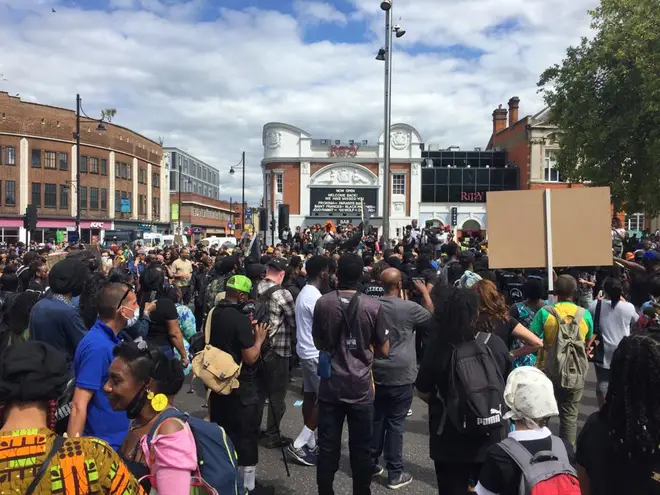
Clive Bull 1am - 4am
1 August 2020, 11:15

Three people have been arrested during protests in Brixton on Saturday for the 2020 Afrikan Emancipation Day.
Hundreds gathered for the event in south London, which marks the abolition of slavery in most British colonies in 1834, and police who monitored the event thanked those who attended for the largely peaceful gathering.
Of those who went, one man was arrested for affray, another man arrested for assaulting an emergency worker, and a woman was arrested for racially aggravated assault
Deputy Assistant Commissioner Laurence Taylor said: “The gatherings today have been largely peaceful and we thank our communities for working with us to ensure the voices of the community could be heard safely and done so responsibly to ensure the safety of all”.
The seventh year of the event today was held after a wave of protests following the murder of George Floyd by a police officer in the United States.
There are concerns about other group attending, however, including climate change activists from Extinction Rebellion who have turned up to offer support.
The crowd gathered at Windrush Square in South London on Saturday morning to call for reparations for the slave trade and to offset the payments made to slave owners, who were compensated heavily by the British Government following abolition.
London Mayor Sadiq Khan has welcomed the event but urged people to "find an alternative safe way to make your voices heard" - and said that if people choose to attend they should adhere to social distancing rules and wear face coverings.
Tomorrow sees the annual Afrikan Emancipation Day Reparations march in Brixton, as the momentum continues for lasting change to tackle the racism and inequalities that black people still face in our city and around the world.
— Mayor of London (gov.uk/coronavirus) (@MayorofLondon) July 31, 2020
To help keep yourselves and your family and friends safe from COVID-19, I urge those considering attending to find an alternative safe way to make your voice heard this weekend. And if you do attend, make sure you practise social distancing and use face coverings.
— Mayor of London (gov.uk/coronavirus) (@MayorofLondon) July 31, 2020
The group that organises the event each year - the Afrikan Emancipation Day Reparations March Committee - claims this year's march will be different, calling it a 'Rebellion Groundings' instead of a march.
Organisers have expressed frustration at the Government for not exploring the issue of reparations seriously and wants to see a commission established in Parliament.
Esther Stanford-Xosei, spokesperson for the Committee, wrote in a blog: "This year will be different. We are instead organising the Afrikan Emancipation Day Reparations Rebellion Groundings, which will take the form of a Brixton Road lock-down.
"We are not being heard in our people’s demand for the UK government to establish an All-Party Parliamentary Commission of Inquiry for Truth & Reparatory Justice.
She added: "We are sick and tired of the UK government telling us that 'we do not believe reparations are the answer', hence we have decided to be more challenging by engaging in this form of peaceful non-violent direct-action."
On 1 August, 1834, the Slavery Abolition Act came into effect and freed over 800,000 slaves in British colonies across the world.
Years later, in 1837, the Slave Compensation Act was enacted and entitled slave owners to compensation which amounted to £20 million - around 40% of the Government's annual income at the time.
Campaigners argue that the modern-day Government should help resolve the issues of slavery through a form of reparations, and say that slavery has caused inter-generational poverty, dispossession and displacement for millions of Africans and people of African descent.
Earlier this month, Lambeth Council called on the Government to launch a commission and commit to reparations to address the UK’s role in the slave trade.
Following the Black Lives Matter protests in the UK in May and June, some companies and their former bosses with ties to slavery have agreed to pay compensation.
The pub chain Greene King and insurance firm Lloyd's of London apologised and pledge payments to BAME groups.